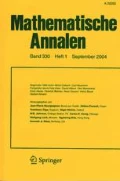Abstract
We continue to investigate the race between prime numbers in many residue classes modulo q, assuming the standard conjectures GRH and LI. We show that provided \(n/\log q \rightarrow \infty \) as \(q \rightarrow \infty \), we can find n competitor classes modulo q so that the corresponding n-way prime number race is extremely biased. This improves on the previous range \(n \geqslant \varphi (q)^{\epsilon }\), and (together with an existing result of Harper and Lamzouri) establishes that the transition from all n-way races being asymptotically unbiased, to biased races existing, occurs when \(n = (\log q)^{1+o(1)}\). The proofs involve finding biases in certain auxiliary races that are easier to analyse than a full n-way race. An important ingredient is a quantitative, moderate deviation, multi-dimensional Gaussian approximation theorem, which we prove using a Lindeberg type method.
Similar content being viewed by others
Notes
We remark that the case \(k=1\) is not excluded from the non-uniformity result for technical reasons, but because it is genuinely different. Harper and Lamzouri [8] showed that \(\delta ^\flat _1(q;a_1, \dots , a_n) \sim 1/n\) provided \(n = o(\varphi (q)^{1/32})\), when \(q \rightarrow \infty \). Notice that Theorem 1.3, below, deals with \(\delta ^\flat _{2k}(q;a_1, \dots , a_n)\) and \(\delta ^\sharp _{2k}(q;a_1, \dots , a_n)\), so the case of \(\delta ^\flat _1(q;a_1, \dots , a_n)\) is again excluded.
References
Bentkus, V.Y.: Large deviations in Banach spaces. Theory Probab. Appl. 31(4), 627–632 (1986)
Feuerverger, A., Martin, G.: Biases in the Shanks–Rényi prime number race. Exp. Math. 9(4), 535–570 (2000)
Fiorilli, D.: Highly biased prime number races. Algebra Number Theory 8(7), 1733–1767 (2014)
Fiorilli, D., Martin, G.: Inequities in the Shanks–Rényi prime number race: an asymptotic formula for the densities. J. Reine Angew. Math. 676, 121–212 (2013)
Ford, K., Konyagin, S.: Chebyshev’s conjecture and the prime number race. Modern Problems of Number Theory and its Applications; Topical Problems Part II (Tula, Russia, 2001)
Ford, K., Konyagin, S.: The prime number race and zeros of L-functions off the critical line. II. Proceedings of the Session in Analytic Number Theory and Diophantine Equations, p. 40, Bonner Math. Schriften, 360, Univ. Bonn, Bonn (2003)
Granville, A., Martin, G.: Prime number races. Am. Math. Mon. 113(1), 1–33 (2006)
Harper, A.J., Lamzouri, Y.: Orderings of weakly correlated random variables, and prime number races with many contestants. Probab. Theory Relat. Fields 170(3–4), 961–1010 (2018)
Hooley, C.: On the Barban–Davenport–Halberstam theorem: VII. J. Lond. Math. Soc. (2) 16, 1–8 (1977)
Lamzouri, Y.: The Shanks–Rényi prime number race with many contestants. Math. Res. Lett. 19(03), 649–666 (2012)
Lamzouri, Y.: Prime number races with three or more competitors. Math. Annal. 356, 1117–1162 (2013)
Martin, G., Scarfy, J.: Comparative Prime Number Theory: A Survey, p. 37. arXiv:1202.3408
Montgomery, H.L., Vaughan, R.C.: Multiplicative Number Theory I: Classical Theory, 1st edn. Cambridge University Press, Cambridge (2007)
Rubinstein, M., Sarnak, P.: Chebyshev’s bias. Exp. Math. 3(3), 173–197 (1994)
Acknowledgements
We would like to thank the anonymous referee for carefully reading the paper, and for thoughtful remarks and suggestions.
Author information
Authors and Affiliations
Corresponding author
Additional information
Communicated by Kannan Soundararajan.
Publisher's Note
Springer Nature remains neutral with regard to jurisdictional claims in published maps and institutional affiliations.
Kevin Ford was supported by National Science Foundation Grant DMS-1501982. Adam Harper was supported, for part of this research, by a research fellowship at Jesus College, Cambridge. Youness Lamzouri is partially supported by a Discovery Grant from the Natural Sciences and Engineering Research Council of Canada. In addition, part of this work was carried out at MSRI, Berkeley during the Spring semester of 2017, supported in part by NSF Grant DMS 1440140; and part of the writing up was supported by funding (for Ford and Harper) from the Simons Foundation and the Centre de Recherches Mathématiques, Montréal, through the Simons-CRM scholar-in-residence program.
Rights and permissions
About this article
Cite this article
Ford, K., Harper, A.J. & Lamzouri, Y. Extreme biases in prime number races with many contestants. Math. Ann. 374, 517–551 (2019). https://doi.org/10.1007/s00208-019-01810-x
Received:
Revised:
Published:
Issue Date:
DOI: https://doi.org/10.1007/s00208-019-01810-x



